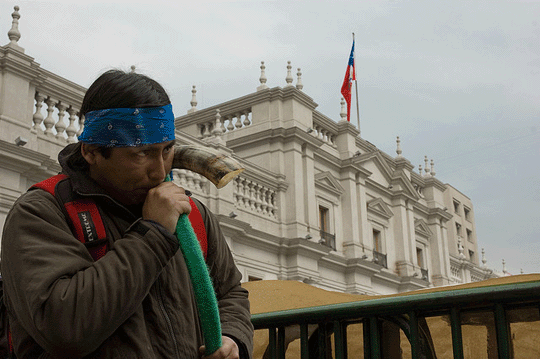



By Valerie Dekimpe
Published On : Sun, Oct 12th, 2014

A Mapuche protester airs his grievances in front of La Moneda. Photo via Flickr / the future is unwritten.
A recent survey, conducted by the National Youth Institute (INJUV), highlights the concern expressed by Chile’s youth regarding the treatment of indigenous communities. More than two thirds of the 1,032 individuals aged between 15 and 20 interviewed believe the government does not respect indigenous rights.
In an interview with The Santiago Times, Isabel Cañet, regional coordinator of Wallmapuwen — a Mapuche organization — welcomed the survey’s findings but warned discrimination in the south, the epicenter of the conflict, has not receded.
“Society is extremely polarized and Mapuche heritage is often viewed as something to be ashamed of,” she said.
“One thing is to agree the state does not respect indigenous rights, but the other is to genuinely value Mapuche heritage.”
However, according to the survey the majority associate their origins to the indigenous people while 96 percent consider indigenous people important to the country’s culture.
Since the end of Gen. Augusto Pinochet’s dictatorship, indigenous activism has been increasingly visible. As a result, public policy towards the Mapuche population has received more attention from policy makers and citizens alike.
According to Francisca de la Maza Cabrera, an anthropologist from Pontificia Universidad Católica de Chile, policy has revolved around improving living conditions for the Mapuche.
“The government has not acknowledged the importance of addressing the issue of indigenous rights, not only from a socio-economic perspective, but also from a political one,” de la Maza told The Santiago Times.
Although the demands from indigenous groups vary, cultural recognition is high up on the list. The Mapuche community at large demands political and administrative autonomy from the Chilean state.
De la Maza also emphasized the need for greater interaction between cultures.
“Despite the focus on interculturalism, public policy continues to be aimed at only indigenous people, it is not intercultural, it does not include the rest of society,” the anthropologist said.
Cañet, who identifies as Mapuche, echoed the academic’s perspective and stressed the difficulty in changing mentalities.
“This country does not recognize multiple nationalities. And it will be very hard to recognize that we can share a state that is composed of different communities, one of of those being the Mapuche community,” she said.
The recent survey comes as conflict between local settlers and the Mapuche community continues to escalate. The Police Special Operations Unit (GOPE) arrived in the Araucanía region Tuesday to defuse tensions building up over the death of a Mapuche in a confrontation with landowners.
Ethnic Mapuche José Mauricio Quintriqueo was run over by a farm worker on a tractor after 20 Mapuche individuals staged what they claim was a peaceful occupation of their ancestral land.
Meanwhile, an indigenous community from Northern Chile cheered on as Chile’s Supreme Court halted the activities of a Canadian mining giant over environmental concerns.
Source: The Santiago Times